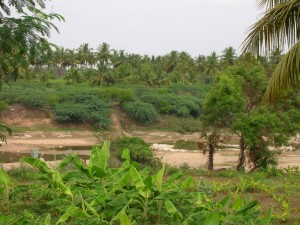India is jetting forward on the economic front. There are talks that BRIC nations are planning to setup a development bank, a competitor to International Monetary Fund (IMF). Ah, to have arrived. But…
An article in yesterday’s The Hindu, The past & present of Indian environmentalism, should make us at least hit the pause button while we rethink our approach to development and progress.
Our economic liberalization seems to have come at a great cost to our environment. To quote the author:
India today is an environmental basket-case; marked by polluted skies, dead rivers, falling water-tables, ever-increasing amounts of untreated wastes, disappearing forests. Meanwhile, tribal and peasant communities continue to be pushed off their lands through destructive and carelessly conceived projects. A new Chipko movement is waiting to be born.
This hunger for material wealth at the cost of everything else does not stop within our own borders either. See Indian investors are forcing Ethiopians off their land and India emerges as leader in 21st century ‘Scramble for Africa’ for more damning details. It looks like India has donned the role of villain in this play.
None other than the father of our nation foresaw this eventuality and warned us of this outcome. And, that too in 1928 for god’s sake! From that same article above:
In 1928, 45 years before the birth of the Chipko movement, Mahatma Gandhi had said: “God forbid that India should ever take to industrialisation after the manner of the West. The economic imperialism of a single tiny island kingdom (England) is today keeping the world in chains. If an entire nation of 300 million took to similar economic exploitation, it would strip the world bare like locusts.”
He was concerned about 300 million becoming rapacious. The population now stands at 1.2 billion! Imagine the associated damage.
But I refuse to accept that this is the last act of the play.
Capitalism 1.0 has already shown that its single-pointed focus on money is not sustainable. As examples from recent financial meltdowns to bailouts to oil spills to sweatshops have shown, it has only succeeded in damaging everyone and everything around it.
It is time for Capitalism 2.0 where everything — people, environment, and profit — mattered. Aside: I may be showing my capitalist leanings, but I do strongly believe that profits also matter in the overall order of things. :)
India still has time to be recast as the hero of this drama. This is the country that inspired the world with its non-violent struggle for freedom. We are the people who have managed to retain a strong current of spirituality even in this material world. Now, there is a real urgency and opportunity for India to become the leader of another movement, this time for Capitalism 2.0 (or a cool and unique Indian name similar to jugaad in the business world).
There are efforts brewing in various corners toward this, which is what makes me hopeful.
On the one side are attempts at creating south-south partnerships of civil society organizations such as the one described in Indian land grabs in Ethiopia show dark side of south-south co-operation:
…Oakland Institute, in partnership with Indian civil society groups the Indian Social Action Forum (Insaf), Kalpavriksh and Peace, organised an Indian-Ethiopian summit on land investments in New Delhi in February. Obang Metho of the Solidarity Movement for a New Ethiopia and Nyikaw Ochalla from the Anywaa Survival Organisation, members of the Anuak community of Gambela, Ethiopia, travelled to India with shocking testimonies of how their community has been dispossessed of livelihoods, ill-treated and subjected to misery while the Ethiopian government leases land to Indian corporations at giveaway prices.
This coming together of Indian and Ethiopian civil society groups marks a turning point in the struggle for land rights and livelihoods in the two countries and beyond. For the first time, the agony of communities who face human rights abuses as their lands are taken over has reached the investors’ doorstep, sending a powerful message to the investors and governments of Ethiopia and India.
From the spiritual side, there are campaigns like the InDeed Campaign whose mission is to restore the balance between humanity and nature, created by Amma’s Embracing the World (Full Disclosure: I am a devotee). As Amma said while inaugurating the organic farming program:
We have not inherited the land from our ancestors; we have borrowed it from our children. We have to return this land to the coming generations without allowing even the slightest damage to happen to it.
It is now upto us to decide whether India will be the hero or villain in deciding what road to take for the future. Let us create a new world where material, physical, emotional, and spiritual well-being of everyone and everything, especially the environment, matters.

